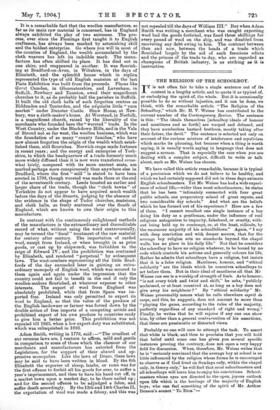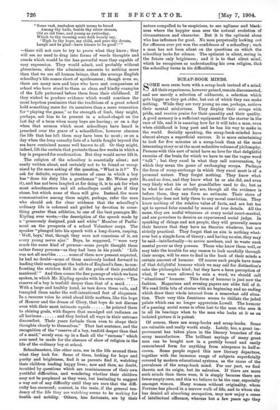THE RELIGION OF THE SCHOOLBOY.
IT is not often fair to take a single sentence out of its context in a lengthy article, and to quote it as typical of, or embodying the spirit of, the whole. But it is occasionally possible to do so without injustice, and it can be done, we think, with the remarkable article, " The Religion of the Schoolboy," which Mr. H. V. Weisse has contributed to the current number of the Contemporary Review. The sentence is this : " The ideals themselves [schoolboy ideals of honour and manliness and so forth] are warped and debased, and they have numberless bastard brethren, mostly taking after their father, the devil." The sentence is selected not only on account of the curious mixture of intolerance and mysticism which marks its phrasing, but because when a thing is worth saying, it is usually worth saying in language that does not suggest a scream. That is especially the case when you are dealing with a complex subject, difficult to write or talk about, such as Mr. Weisse has chosen.
We have called this article remarkable, because it is typical of a pessimism which we do not believe to be healthy, and which we had certainly supposed did not in these days animate English schoolmasters. Yet Mr. Weisse has had a wide experi- ence of school life,—wider than most schoolmasters; he states that be has been " intimately connected with four great public schools, one preparatory school of great repute, and two considerable day schools." And what are the beliefs which he has formed out of his experience ? Here are a few of them. " I cannot recollect one single instance of a boy doing his duty as a gentleman, under the influence of real religious antagonism to impurity, falsehood, or cruelty, with- out being held up to contempt, or, at the least, ridicule, by the enormous majority of his schoolfellows." Again, " I say with deep conviction and with deeper sorrow, that for the average boy religion sets no standards beyond the chapel walls, has no place in his daily life." Not that he considers the schoolboy to have no religion whatever, to be bound by no code which controls his actions and generally colours his life. Rather he admits that schoolboys have a religion, but insists that it is a false religion. Manliness, honour, and "ethical solidarity " are the ideals which be conceives schoolboys to set before them. But in their ideal of manliness all that Mr Weisse can see is a worship of strength of limb. As to honour, "is not every trick and twist and shift," he asks, "publicly acclaimed, or at least connived at, so long as a boy does not give away his neighbour ? " By " ethical solidarity" Mr. Weisse presumably means what he calls elsewhere esprit de corps, and this, he suggests, does not amount to more than " playing the game, according to the rules of the majority, perfectly regardless of any standard of right and wrong." Finally, he writes that he will rejoice if any one can show him, by other than a general contravention of his assertions,
that these are pessimistic or distorted views. .
Probably no one will care to attempt the task. To assert that white is black, and then to proclaim that you will hold that belief until some one has given you several specific instances proving the contrary, does not open a very happy field for discussion. When, therefore, Mr. Weisse writes that he is " seriously convinced that the average boy at school is as little influenced by the religion whose forms he is encouraged to observe as if God lived on Sundays only, within the chapel only. in theory only," he will find that most schoolmasters and all schoolboys will leave him to enjoy his convictions. School- masters whose eyes are directed to the open, joyous outlook upon life which is the heritage of the majority of English boys; who can feel something of the spirit of Mr. Arthur Benson's sonnet " To Eton"—
" Some vast, unshaken spirit seems to brood Among thy halls, beside thy silver stream, Old as old time, and young as yesterday, Which to thy teeming sons doth hourly say, `High be thy hope, my child, and pure thy dream, Laugh and be glad—have leisure to be good ! '
—these will not care to try to prove what they know ; they will see no need to drag into forms of words thoughts and
creeds which would be the less powerful were they capable of easy expression. They would admit, and probably without gloominess, since the admission amounts to nothing more than that we are all human beings, that the average English schoolboy's life comes short of spotlessness ; though even so, there are many men and boys who have met companions at school who have stood to them as clean and kindly examples of the Life patterned before them from their childhood. If they wished to produce evidence which would convince the most hopeless pessimists that the traditions of a great school hold something more for its members than a mere veneration for "playing the game," or for strength of limb, they might, perhaps, ask him to be present in a school-chapel on the last day of a term when many boys are leaving; or on a day when that sermon which most schoolboys have heard is preached over the grave of a schoolfellow, however obscure the life that has left them may have been to most; or on a
day when the long casualty lists of a battle fought beyond the sea have contained names well known to ail. Or they might, indeed, lift the curtain that protects those few weeks in which a boy is prepared for confirmation. But they would never lift it.
The religion of the schoolboy is essentially silent; not easily written about, and certainly not to be found or recog- nised by the mere asking of the question, "What is it ?" To ask for definite, separate instances of cases in which a boy has " done his duty like a gentleman" (as Mr. Weisse puts it), and has not been laughed at for doing it, is to ask for what most schoolmasters and all schoolboys could give if they chose, but which none of them will give. Instead, the more communicative among them might, perhaps, refer the man who should ask for clear evidence that the schoolboy's ordinary life is coloured and guided by devotion to some- thing greater than athletics, to one of the best passages Mr. Kipling ever wrote,—the description of the speech made by a " generously designed, pink and white" Member of Parlia- ment on the prospects of a school Volunteer corps. The speaker "plunged into his speech with a long-drawn, rasping, Well, boys,' that, though they were not conscious of it, set every young nerve ajar." Boys, he supposed, " ' were very much the same kind of persons—some people thought them rather funny persons—as they bad been in his youth.' Life was not all marbles some of them now present expected, he had no doubt—some of them anxiously looked forward to leading their men against the bullets of England's foes ; to con- fronting the stricken field in all the pride of their youthful manhood." And then comes the fine passage of which we have spoken, in which Mr. Kipling speaks with his own voice : " The reserve of a boy is tenfold deeper than that of a maid With a large and healthy hand, he tore down these veils, and trampled them under the well-intentioned feet of eloquence. In a raucous voice he cried aloud little matters, like the hope of Honour and the dream of Glory, that boys do not discuss even with their most intimate equals he pointed them to shining goals, with fingers that smudged out radiance on all horizons and they looked all ways in their extreme discomfort. Their years forbade them even to shape their thoughts clearly to themselves." That last sentence, and the recognition of the " reserve of a boy, tenfold deeper than that of a maid," surely sum up in a flash all the "excuses" which ever need be made for the absence of show of religion in the life of the ordinary boy at school.
Schoolmasters, like other men, see in the life around them what they look for. Some of them, looking for hope and purity and brightness, find it as parents find it, watching their children leading happy lives ; now and then, no doubt, troubled by questions which are reminiscences of their own youthful difficulties, and wondering whether their children may not be perplexed as they were, but hesitating to suggest a way out of any difficulty until they are sure that the diffi- culty has occurred; content, in the main, if the general ten- dency of the life they are watching seems to be making for health and nobility. Others, less fortunate, are by their nature compelled to be suspicions, to see ugliness and black- ness where the happier man sees the natural evolution of circumstances and character: But it is the optimist alone who has influence for good. No man perpetually looking out for offences ever yet won the confidence of a schoolboy ; such a man has not been silent on the questions on which the schoolboy looks for silence. The optimist is silent, seeing in the future only brightness; and it is to that silent mind, which he recognises as understanding his own religion, that the schoolboy turns in his difficulties.











































 Previous page
Previous page